At 2:00 PM on Sunday, March 10, 2013 the house lights dim then brighten and Dianna Shuster, Executive Director comes on stage to make her opening announcement. A few of us old-timers start to applaud, not only to tell Dianna that we love her, but to signal the still buzzing faction in the audience that it’s time to shut up and pay attention. Dianna begins by welcoming the audience back to the Florence Gould Theatre after a two-year absence (applause) and the further good news that the theatre is sold out (more applause). Next comes the usual routine about exits and cell phones and the conclusion telling us to sit back and enjoy Donald Pippin’s translation of Mozart’s Don Giovanni.
The orchestra and Donald file on stage and get settled, then as usual Donald comes forward to tell us something about the opera. Only this time he has a serious and worried expression and brings us a dire warning about the main character – “According to my notes, he has been called:
An evil monster A cold blooded reptile A slimy serpent, a lethal serpent A fiend out of hell A public menace A ruthless hunter An aristocratic lecher A master of cunning and conniving An animal, a beast of the jungle From top to toe a scoundrel But then, nobody’s perfect.”
Donald goes on to admit that Don Giovanni can be utterly charming, and concludes with an explicit warning to the women in the audience that they stay here at their own peril.
Many of you have seen Don Giovanni many times before and need no reminder about the plot. But whether this is your first encounter or your twenty-first, I recommend that you read Donald Pippin’s scintillating synopsis before continuing to read my review.
That synopsis leads us at some length through the various plot twists of Act I, but the entire Act II description consists of a single paragraph:
We also get the answer to a number of pressing questions. Will Don Giovanni proceed triumphantly to the final curtain, or will he carry his audacity too far and invite his own doom from a totally unexpected source? Will Donna Anna get her revenge? Will Don Ottavio finally become convinced that Giovanni is the man they are looking for? How much more will it take for Donna Elvira to wake up to her own folly? Will Zerlina and Masetto settle down to a placid, uneventful married life? Will Leporello finally carry out his repeated vow to break away from his unscrupulous master? What pivotal role is played by a marble statue? Far be it from us to spoil the ending. (Italics mine – Opera Nut)
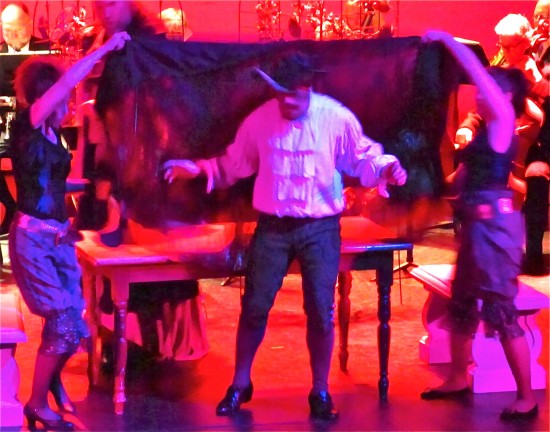
Don Giovanni (Samuel Rabinowitz) is dragged off to Hell by two female demons; photo by Robert Selinske
Donald, of course, was writing for an audience about to enjoy a live performance, whereas I am writing solely for people who will never see this production again. Therefore, I have no scruples about stating that the ending always has Don Giovanni literally going to Hell. That’s what Mozart stipulates, but he doesn’t provide details. I have seen productions filled with fancy stage effects – an open trap-door with flames shooting out and ghostly arms clutching G’s ankles to pull him in; off-stage flames at the side or back and G being pushed or pulled into them – a loud explosion with flashing red strobes and billowing stage-smoke blocking all vision; when the smoke cleared the Don was missing. Pocket Opera, as usual, makes up in ingenuity what it lacks in material resources. We saw a couple of female demons waltz in and block G’s attempt to flee; they unfurled a large cloth covered with painted flames, half-wrapped it around G, and dragged him off stage. Most effective.
So now you know all about the plot. Let me spend the rest of my review talking about the cast that performed it so well. First of all, it was a great mix of newcomers and Pocket Opera veterans. Marcelle Dronkers (Donna Anna) has been one of my favorites since I first found Pocket Opera twenty years ago. Her soprano voice is as delightful as ever and her mobile face registers plenty of grief and sorrow. Her role doesn’t give any opportunity for her wonderful comic timing, but one can’t have everything.
According to the Cast list on page 2 of the program, Giovanni’s other Donna, Donna Elvira, is sung by Elliot Franks, but the Cast Biographies on page 7 assigns the role to Elspeth Franks. I recognized the rather distinctive face (despite a rather atrocious wig) as that of the same Elspeth Franks whom I had seen and heard many times over the years. Obviously, Thereby Hangs A Tale – but since that Tale does not yield to a google search and is only implied (not explicitly stated) in the program, I have already given it more space than is proper.
My excuse is that I have a very personal interest is such Tales because my eldest grandchild was known as April during the first third-of-a-century of existence, but has recently taken legal steps to change it to Aaron and is currently taking medical steps to implement that change. As April she had a fine soprano voice – no pretensions as to stage quality but far above the average quality of voices I heard at her cousin’s Bat Mitzvah a few years ago. As Aaron, he is very concerned that however the range may change, the quality will remain pleasant to himself and to others.
I am pleased to report that Elliot’s voice was still the powerful soprano that Mozart wrote the part for. I note with interest that the last time I heard Elspeth on stage she was a woman playing a trouser role in Handel’s Rinaldo whereas on Sunday Elliot was a man dressed in drag. Clearly quality is far more important than gender when it comes to opera. Indeed, I suspect the same observation could be made about most aspects of life.
It was nice to see Richard Mix again. I don’t recall his being in any Pocket Opera productions last year, but he frequently showed up the year or two before. He is an impressively large man with a deep booming voice. The Commendatore is not a large role, but it is a vital one in the opening and closing scenes of the opera.
One of the special joys in going to so many local operas is seeing a young singer develop from an unidentified member of the chorus to increasingly important named roles. Jordan Eldredge has a distinctive face and it seemed like I was seeing him in the Pocket Opera chorus more often than not in recent years. I really enjoyed his performance in the significant role of Masetto. 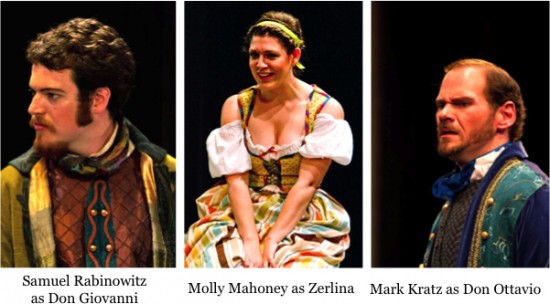 Two of the cast members, Molly Mahoney (Zerlina) and Samuel Rabinowitz (Don Giovanni), were new to Pocket Opera. A third, Mark Kratz (Don Ottavio), I had seen only once before as the Centurion in Norma a couple of years ago. I continue to be impressed by the number of very good singer-actors who appear in the Bay Area.
Two of the cast members, Molly Mahoney (Zerlina) and Samuel Rabinowitz (Don Giovanni), were new to Pocket Opera. A third, Mark Kratz (Don Ottavio), I had seen only once before as the Centurion in Norma a couple of years ago. I continue to be impressed by the number of very good singer-actors who appear in the Bay Area.
All of the singing and acting was good, but the role that impressed me the most in this performance was Cliff Romig as Leporello. His bass voice really boomed out, and his acting clearly showed the various aspects of Leporello. I have seen and heard him in many previous Pocket Opera performances and in a variety of Opera San Jose productions when he was a resident artist there a few years back. His bio in the program indicates that he will be singing in the chorus of San Francisco Opera this fall. One of the many wonderful things about Pocket Opera, West Bay Opera, and other small companies in the Bay Area is that they provide opportunities for chorus-level singers with our great-big company in San Francisco to practice and showcase their talents as featured soloists as they develop. Personally, I think that Romig is already capable of handling a major role with SFOpera, but then, I’m only, 
P. S. Sorry to be late with this review so that you�ve already missed the final performance of Don Giovanni. However the 2013 Pocket Opera season continues, so you can still see an opera a month, April through July: 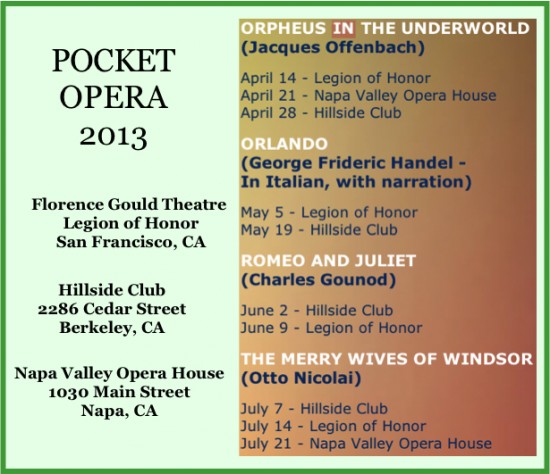
Photos: Except as stated otherwise, photos by Cliff Romig.
Tables and photo arrangements by Philip Hodge.
This review by Philip G Hodge appeared in sanfranciscosplash.com on March 23, 2013.

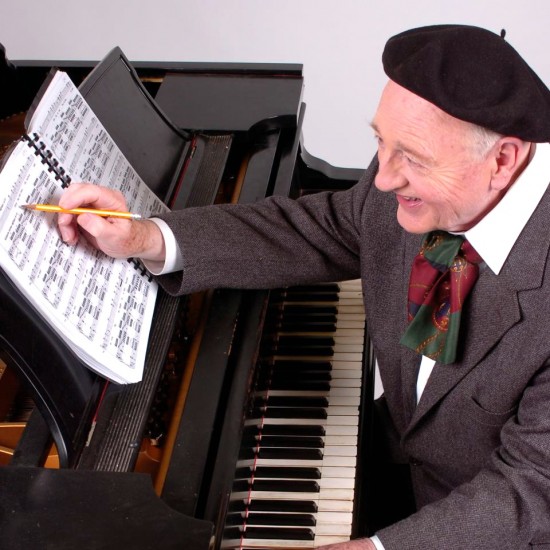


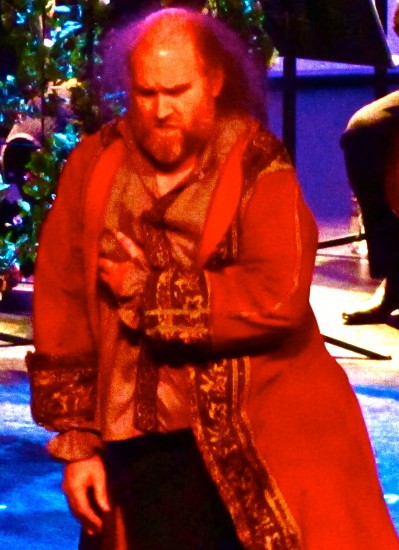

Thank you so much for this exuberant review!
Hope to see you at Merry Wives, when Meghan Dibble and I get to be goofy as all get-out, Donald style!